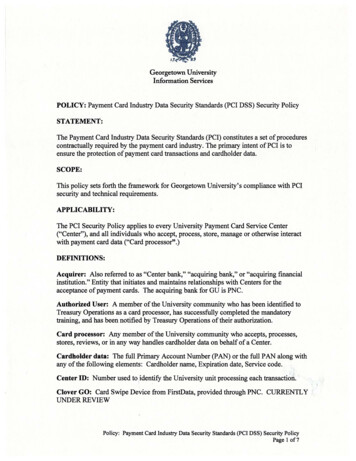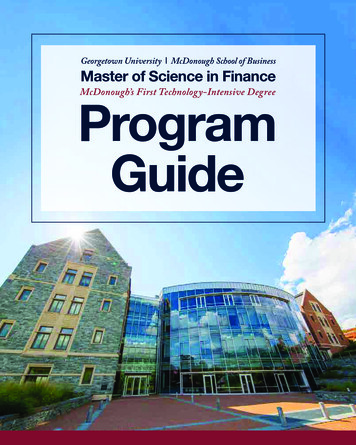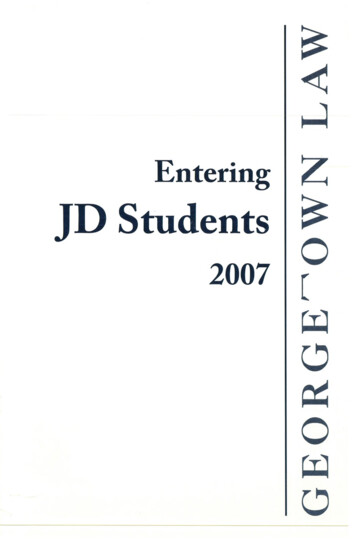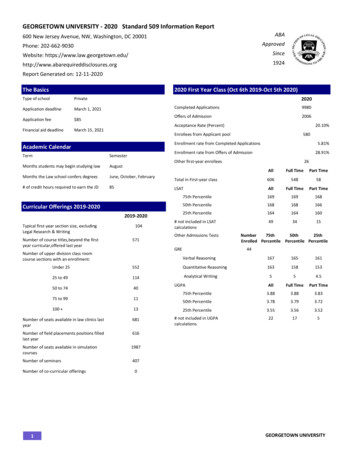
Transcription
Georgetown UniversityInformation ServicesPOLICY: Payment Card Industry Data Security Standards (PCI DSS) Security PolicySTATEMENT:The Payment Card Industry Data Security Standards (PCI) constitutes a set of procedurescontractually required by the payment card industry. The primary intent of PCI is toensure the protection of payment card transactions and cardholder data.SCOPE:This policy sets forth the framework for Georgetown University's compliance with PCIsecurity and technical requirements.APPLICABILITY:The PCI Security Policy applies to every University Payment Card Service Center("Center"), and all individuals who accept, process, store, manage or otherwise interactwith payment card data ("Card processor".)DEFINITIONS:Acquirer: Also referred to as "Center bank," "acquiring bank," or "acquiring financialinstitution." Entity that initiates and maintains relationships with Centers for theacceptance of payment cards. The acquiring bank for GU is PNC.Authorized User: A member of the University community who has been identified toTreasury Operations as a card processor, has successfully completed the mandatorytraining, and has been notified by Treasury Operations of their authorization.Card processor: Any member of the University community who accepts, processes,stores, reviews, or in any way handles cardholder data on behalf of a Center.Cardholder data: The full Primary Account Number (PAN) or the full PAN along withany of the following elements: Cardholder name, Expiration date, Service code.Center ID: Number used to identify the University unit processing each transaction.Clover GO: Card Swipe Device from FirstData, provided through PNC. CURRENTLYUNDER REVIEWPolicy: Payment Card Industry Data Security Standards (PCI DSS) Security PolicyPage 1 of7
Dedicated PCI Facility: Space whose primary purpose, or within which one of theprimary activities, is the processing of card.holder data, such as a call center.E-Commerce: Commercial transactions conducted over the InternetPAN: Full Primary Account NumberPayment Application: In the context of PA-DSS, a software application that stores,processes, or transmits card.holder data as part of authorization or settlement, where thepayment application is sold, distributed, or licensed to third partiesPayment card: Credit or debit cardPCI: Payment Card Industry Data Security Standards (also called PCI DSS)Portable (Removable) Electronic Media: Media that store digitized data and which canbe easily removed and/or transported from one computer system to another. Examples ofremovable electronic media include CD-ROM, DVD-ROM, USB flash drives andremovable hard drives.POS Device: Also called Terminal. Authorized device used to process payment cardtransaction. Such transactions may be "Card Present" or "Card Not Present"ROC : Acronym for "Report on Compliance." Report documenting detailed results froman entity's PCI DSS assessment.Security Event: An occurrence considered by an organization to have potential securityimplications to a system or its environment. In the context of PCI DSS, security eventsidentify suspicious or anomalous activitySeparation of Duties: Practice of dividing steps in a function among differentindividuals, so as to keep a single individual from being able to subvert the processService Center: Any University unit with responsibility for processing and managingpayment card transactions and financial procedures, and which is assigned one or moreMerchant IDs by Treasury Operations for the purpose of accepting and processingpayment card transactions.Service Provider: Any company that stores, processes, or transmits card.holder data onbehalf of another entityTerminal: See POS DeviceGUIDING PRINCIPLES/PURPOSE:The PCI DSS Security Policy defines the security standards that Service Centers and cardprocessors must follow in implementing basic safeguards to protect the confidentiality,integrity, and availability of payment transaction and card.holder data.Policy: Payment Card Industry Data Security Standards (PCI DSS) Security PolicyPage 2 of7
ADMINISTRATION AND IMPLEMENTATION:Georgetown University will maintain the security of payment card data in the manner setforth in the Georgetown PCI Security policy and the associated procedures. GeorgetownUniversity will adhere to all applicable general requirements, approaches, standards,specifications, and maintenance requirements of PCI DSS in developing and maintainingpolicies and procedures for security standards for the protection of PCI data. Wheneverthere is a change in the standards that necessitates a change to Georgetown UniversitySecurity policies and procedures, Georgetown University will promptly document andimplement the revised policies and procedures.RESPONSIBILITIES:PCI requires the University to put into place appropriate safeguards to protect theintegrity, confidentiality and availability of payment card data that is received ormanaged by the University's Service Centers.1. ADMINISTRATIVE SAFEGUARDS1.1. Risk Assessment: Georgetown will perform a risk assessment of UniversityService Centers at least annually, and upon significant changes to theenvironment (for example, relocation, etc.) This assessment will identify criticalassets, threats, and vulnerabilities and produce a formal, documented analysis ofrisk.[Addresses PCI DSS Section 12.2.]1.2. Information Security Policy: Georgetown will implement a generalInformation Security Policy, applicable to all members of the UniversityCommunity. The University will establish, publish, maintain, and disseminate aUniversity information security policy, and will review the security policy atleast annually and update the policy when the environment changes. [AddressesPCI DSS Section 12.8.]1.3. Administrative Security - E-Commerce & Third Party Services Only: TheUniversity will define policies and procedures to ensure proper useridentification management for non-consumer users and administrators on all e commerce and third-party solution system components [Addresses PCI DSSSection 8.] Service Centers shall:1.3.1. Establish a procedure that requires authorization before any person isgranted access to systems managing PCI data.1.3.2. Immediately revoke access for any terminated users.1.3.3. Remove/disable inactive user accounts within 90 days.1.3.4. Limit repeated access attempts by locking out the user ID after not morethan six attempts.1.3.5. Set the lockout duration to a minimum of 30 minutes or until anadministrator re-enables the user ID.1.3.6. Incorporate two-factor authentication for usersPolicy: Payment Card Industry Data Security Standards (PCI DSS) Security PolicyPage 3 of7
1.3.7. Require password change at least every 90 days1.3.8. Periodically review the accounts on systems managing PCI to ensure thatonly currently authorized persons have access to these systems.NOTE: Section 1.3 does not apply to Service Centers using only POS terminaldevices.1.4. Information Access Management: All Service Centers will establishprocedures in compliance with the University Information Security Policy and itsassociated procedures, to ensure that only authorized users have access toCardholder data and to the devices and systems that manage such data.[Addresses PCI DSS Section 8.]1.5. Security Awareness and Training: All Service Centers will ensure thateveryone who receives, handles, stores, or otherwise interacts with PCI(Cardholder) data receives PCI security training and periodic ·security updates atleast annually [Addresses PCI DSS Sections 9, 12.]1.6. Password Management: All Service Centers will adhere to the University'sInformation Security Policy as well as the Standards for Password andPassphrase Management.1.6.1. Passwords must be changed immediately if compromised. [Addresses PCISection 8.4.]1.7. Device and Media Controls: Georgetown University does not permit storage ofCardholder data except in temporary form as a paper document. All ServiceCenters will establish procedures to govern the receipt and destruction of papermedia that contain PCI data, and to appropriately secure and manage PCI relateddevices. The movement of these items within the department must bedocumented. [Addresses PCI DSS Section 9.5.]1.8. Visitor Identification: Georgetown must document procedures to identify andauthorize visitors to any Dedicated PCI Facility operated by the University. Suchprocedures shall include:1.8.1. Identifying onsite visitors (for example, assigning badges, using a visitorlog that is maintained for at least 3 months) so as to distinguish them fromauthorized personnel1.8.2. Documenting changes to access requirements1.8.3. Revoking or terminating onsite personnel and expired visitor identification(such as ID badges). [Addresses PCI DSS Section 9.2.]1.9. Service Providers: The University will maintain and implement policies andprocedures to manage service providers with whom cardholder data is shared, orthat could affect the security of cardholder data, as follows:1.9.1. Maintain a list of service providers.Policy: Payment Card Industry Data Security Standards (PCI DSS) Security PolicyPage 4 of7
1.9.2. Maintain a written agreement that includes an acknowledgement that theservice providers are responsible for the security of cardholder data theservice providers possess or otherwise store, process or transmit on behalf ofthe customer, or to the extent that they could impact the security of thecustomer's cardholder data environment.1.9.3. Ensure there is an established process for engaging service providersincluding proper due diligence prior to engagement.1.9.4. Maintain a program to monitor service providers' PCI DSS compliancestatus at least annually.1.9.5. Maintain information about which PCI DSS requirements are managed byeach service provider, and which are managed by Georgetown. [AddressesPCI DSS Section 12.8-9.]Incident Reporting: All Service Centers must have procedures in place so1.10.that the University Information Security Office is notified when PCI data isinvolved in a security incident (examples include virus or worm infection,accounts being compromised, and unintended disclosure of data to unauthorizedindividuals). [Addresses PCI Section 12.10.]2. Physical Safeguards2.1. Dedicated PCI Facility Access Controls: Each Service Center will ensure thatDedicated PCI Facilities are protected by physical security controls that restrictaccess:2.1.1. Access must be authorized and based on individual job function.2.1.2. Access is revoked immediately upon termination, and all physical accessmechanisms, such as keys, access cards, etc., are returned or disabled[Addresses PCI Section 9.3]2.2. Identify and authorize visitors: Implement procedures to identify and authorizevisitors to Dedicated PCI Facilities. Procedures should include the following:2.2.1. Visitors are authorized before entering, and escorted at all times withinareas where cardholder data is processed or maintained.2.2.1.1.Visitors are identified and given a badge or other identification thatexpires and that visibly distinguishes the visitors from onsite personnel.2.2.1.2.Visitors are asked to surrender the badge or identification beforeleaving the facility or at the date of expiration.2.2.2. A visitor log is used to maintain a physical audit trail of visitor activity tothe facility.2.2.2.1.Document the visitor's name, the firm represented, and the onsitepersonnel authorizing physical access in the log.2.2.2.2.Retain this log for a minimum of three months, unless otherwiserestricted by law. [Addresses PCI Section 9.4.]2.3. Management of media: Georgetown University does not permit storage ofCardholder data except in temporary form as a paper document.2.3.1. Physically secure all media including paper in a secure location.I'Policy: Payment Card Industry Data Security Standards (PCI DSS) Security PolicyPage 5 of7
2.3.2. Document notification and approval of any and all movement of mediaout of a secured area For example, document the approval for destruction ofpaper records at the end of processing.2.3.3. Properly maintain inventory logs of all media and conduct mediainventories at least annually. [Addresses PCI Section 9.5-9.]3. Technical SafeguardsUIS will maintain detailed documentation ofstandards andprocedures in supportofthese safeguards, and incorporate them into UISO Procedural Requirements. .3.1. Appropriately implement Risk Management procedures: The University willimplement measures to reduce computer risks and vulnerabilities, including:identifying and documenting potential risks and vulnerabilities that could impactsystems managing PCI cardholder data; and performing annual technical securityassessments of systems managing PCI data, in order to identify and remedydetected security vulnerabilities. [Addresses PCI DSS Section 12.]3.2. Develop usage policies for critical technologies and define proper use ofthese technologies for PCI processes at Georgetown: UIS will identify criticaltechnologies, describe the appropriate usage of such technologies, and maintainthe required documentation of controls [Addresses PCI Section 12.3.]3.3. Information System Activity Review: UIS will review logs and security eventsfor all system components to identify anomalies or suspicious activity, and willfollow up exceptions and anomalies identified during the review process andresolve them. [Addresses PCI Section 10.6]3.4. Assign to individual or team appropriate information security managementresponsibilities. Georgetown will assign responsibility for security policies,procedures, incident response, and access control. [Addresses PCI Section 12.5]3.5. Synchronize all critical system clocks: Using time-synchronization technology,UIS will ensure the synchronization of critical system clocks . [Addresses PCISection 10.4.]3.6. Review logs and security events for all system components: UIS will conductreviews to identify anomalies or suspicious activity, and follow up on exceptionsand anomalies. [Addresses PCI 10.6]3.7. Penetration Testing: UIS will Define and Document standards for penetrationtesting, and perform internal and external Penetration Testing as described inthose standards. [Addresses PCI Section 11.3]3.8. Incident Response: The University Information Security Office will create andmaintain an incident response plan, so as to be prepared to respond immediatelyto a system breach. [Addresses PCI Section 12.10.]Policy: Payment Card Industry Data Security Standards (PCI DSS) Security PolicyPage 6 of7
COMPLIANCE:Every employee with access to cardholder data is required to adhere to all PCI mandates.Violation of this policy may result in disciplinary action up to and including terminationof employment.RESOURCES:University Information Security Policy :: http://security.georgetown.edu/Computer Systems Acceptable Use Policy es/acceptable-useGeorgetown University Payment Card Industry Data Security Standard (PC! DSS) licies/payment-card-industry-data security-standardREVIEW CYCLE:This policy will be reviewed and updated as needed, but at least annually, unless changesin institutional policy or relevant law or regulation dictate otherwise.Reviewed and approved:Date:nterim Vice Presidentand Chief Information OfficerPolicy: Payment Card Industry Data Security Standards (PCI DSS) Security PolicyPage 7 of7
Georgetown University will maintain the security ofpayment card data in the manner set forth in the Georgetown PCI Security policy and the associated procedures. Georgetown University will adhere to all applicable general requirements, approaches, standards, specifications, and maintenance requirements ofPCI DSS in developing and maintaining










